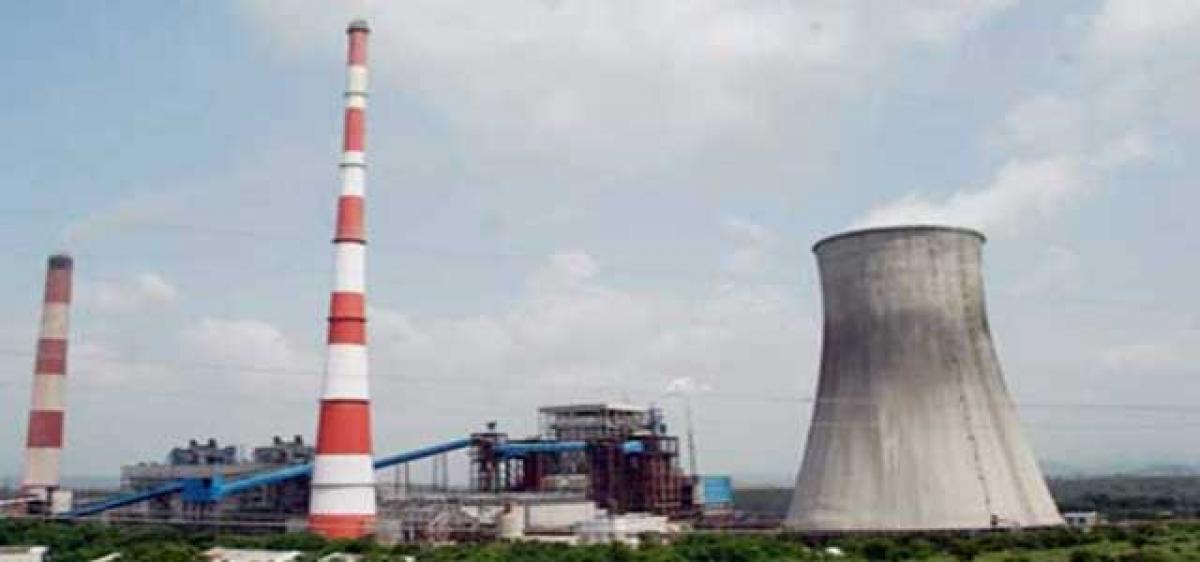Live
- A Guide to Temperature and Humidity Standards in Data Center Server Rooms
- Gadwal collector briefs on details of voters
- Jupally Krishna Rao takes part in Alampur rallu
- Bharath Prasad files 3rd Nomination
- Baisakh Month: A Time of Auspicious Beginnings and Sacred Festivals
- Oust BJD govt for overall development, says Shah
- Unveiling the Hidden Gems: Surprising Health Benefits of Garlic Peels
- Overcoming Sleep Struggles: A Comprehensive Guide to a Restful Night
- RTC bus hit the auto
- MLA Kuchukula Rajesh Reddy participated in the Birappa festival
Just In

The Kothagudem Thermal Power Station (KTPS) while providing the much-needed energy to the state is allegedly responsible for causing massive destruction in five adjoining panchayats inhabited by thousands of residents, including Dalit and girijan families, through the ash generated by it.
Effect of ash is seen more in Pandurangapuram, Suraram, Somulugudem, Payakaram, Yanambailu & Kunakula areas
Kothagudem: The Kothagudem Thermal Power Station (KTPS) while providing the much-needed energy to the state is allegedly responsible for causing massive destruction in five adjoining panchayats inhabited by thousands of residents, including Dalit and girijan families, through the ash generated by it.
CITU district secretary Annavarapu Satyanarayana told The Hans India that KTPS was generating 10,000 metric tonnes of ash while producing 1,720 mw power a day. He said 60 per cent of ash contains pollutants which cause skin and breathing-related diseases.
The balance of 40 per cent is entrusted to some private firms to manufacture bricks and cement. He warns that if KTPS VIII phase is taken up another 3,000 mt of ash could be generated.
Residents of Suraram and other panchayats are afflicted with a variety of ailments of skin, lung and kidney allegedly caused by inhaling the ash.
One Sharada of Suraram complained that residents like her were forced to fall sick at young age, while being mostly employed as labourers. As they have built own houses they can't think of shifting, she points out. Sharada claimed that her 12-year-old son was suffering from a heart problem for inhaling the ash, quoting doctors.
A villager, Itukaboyina Venkatamma, said that her husband had died of an ailment caused by breathing of ash-filled air. Rama Rao of Pandurangapuram said many residents after drinking Kinnerasani water were suffering from diseases like cholera, typhoid and cancer as the administration failed to filter the water. Even many cattle were down with ailments, Rao claimed.
Another resident, Ramesh, accused the KTPS officials of failing to adopt the surrounding villages so as to usher in their development. He alleged that people's representatives have been ignoring the pleas of the residents thus ruling out scope for construction of roads, bunds and drains. He appealed to the government to adopt the affected panchayats for creating the required infrastructure facilities.
Farmers of these panchayats have been hesitating to take up cultivation of cotton, paddy, chilli and red gram in about 30,000 acres in the panchayats, following their damage on account of spread of ash. Some ryots told THI that they have eking out their lives by growing ‘zama oil’ trees as an alternative.
The pleas of residents to officials to save them from the threats posed by ash have fallen on deaf ears. Sadly this alarming situation which prevailed right from the launch of KTPS when Andhra Pradesh was a unified State is continuing even after the formation of Telangana, as also the new districts.
These residents, while speaking to this correspondent, complain that the ash is being released by pipes into the Kinnerasani vagu that flow through the panchayats changing the colour of water. Consumption of this water is causing diseases in both people and animals. The effect of ash is seen more in Pandurangapuram, Suraram, Somulagudem, Payakaram, Yanambailu and Kunakula.
These villagers accuse the KTPS officials of failing to honour their promise of providing special facilities including hospitals, schools, roads. They question the official justification in taking credit for being the country's best thermal station, even while causing diseases to many nearby residents. Local youths grumble that the officials' promise of providing employment to them has been limited to only 70 and that approaching courts for redress did not help.

© 2024 Hyderabad Media House Limited/The Hans India. All rights reserved. Powered by hocalwire.com







